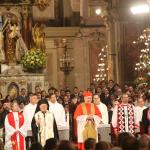
Some who has a weak faith nonetheless still has faith. One cannot be weak in faith if they have no faith whatsoever. Those who are weak in faith should be, indeed, must be welcomed and respected by those whose faith is stronger. “As for the man who is weak in faith, welcome him, but not for disputes over opinions” (Rom 14:1 RSV). When they are encountered, and show their confusion and doubts, they must welcomed and treated well. They are members of the church, for they still have faith and belong to the Christian family. No matter how little their faith is, it is faith. And, as Jesus said that faith as little as a mustard seed can move mountains, even a little faith can and will produce great spiritual fruit.
Those who have little faith might have great doubts, they might have questions, they might not understand or know everything about the faith, but they still have faith and it still motivates and guides them, having them reach out to God. Just because they have doubts, just because they are conflicted on theological issues, does not mean we should treat them as they are unbelievers, for, as Origen said, they are believers: “For it is one thing to be an unbeliever and something else to be weak in faith. For one who does not have faith is called an unbeliever; but one who hesitates in some aspect of the faith is weak in faith.”[1]
Constantly challenging people on what doctrines they know and understand is not welcoming; rather, if that is all they encounter, they will feel very unwelcome. Those who are treated poorly because they are not theological scholars, because they do not know how to answer subtle questions, might come to believe the faith is not for them and go away. This is why they should be encouraged by their fellow Christians. They must be made to feel they are loved so that their faith can grow and mature. Sadly, as so many of us treat them with such harshness, their faith is strangled before it can grow and so it withers and dies. When we try to show off our faith, when we try to show off what we know, when we try to act all self-righteous in front of those who are weak in faith, our vainglory gets in the way of our neighbor’s faith. They will wonder if that is what Christianity is about and if the faith is truly for them.
When Paul wrote about various disputes in his day and age, he said many of them came about because those who believed they were of a strong, mature faith thought others must be just like them if they are to be seen as faithful Christians. Instead of considering how God loves all, and gives grace to everyone, freedom to Christians, they suggested everyone must be encouraged to be just like them. Paul warned us not to be like this. Thus, for example, when some used what people ate as to determine the quality of one’s faith, he said this was wrong to do:
One believes he may eat anything, while the weak man eats only vegetables. Let not him who eats despise him who abstains, and let not him who abstains pass judgment on him who eats; for God has welcomed him. Who are you to pass judgment on the servant of another? It is before his own master that he stands or falls. And he will be upheld, for the Master is able to make him stand (Rom 14:2-4 RSV).
Coming to the Great Fast, Great Lent, let us reflect upon and heed these words. Each of us will engage the fast differently. We should remember the point of the fast is to help us grow in faith and virtue, to grow in our devotion to Jesus as well as in our love for our neighbor. If instead of focusing on our own spiritual development and needs, we pay attention to what others are doing and attack them if we think they are not following the fast properly, we show we do not understand and follow the purpose of the fast ourselves. It is not about what we eat, but how we grow in faith; those who are weak in faith, those who are further behind in the faith, should be encouraged, not discouraged, by us; likewise, we might think we are better than others, stronger in the faith, and judge wrongly, as we do not know the situation of those who we judge. We must not turn the fast into a show, trying to make ourselves look great:
And when you fast, do not look dismal, like the hypocrites, for they disfigure their faces that their fasting may be seen by men. Truly, I say to you, they have received their reward. But when you fast, anoint your head and wash your face, that your fasting may not be seen by men but by your Father who is in secret; and your Father who sees in secret will reward you (Matt. 6:16-18 RSV).
We should act and be as normal as possible. This means, to many, it might appear that we are not engaging the Great Fast. As the fast is for own our own self-improvement, we should judge ourselves and use that judgment call to determine how we should engage the fast and what we should do during the fast. As St. Hilary of Poitiers explained, we will see the fast is working if it helps us become more gracious to others:
He teaches us that the benefit of fasting is gained without the outward display of a weakened body, and that we should not curry the favor of the pagans by a display of deprivation. Instead, every instance of fasting should have the beauty of a holy exercise. For oil is the fruit of mercy according to the heavenly and prophetic word. Our head, that is, the rational part of our life, should be adorned with beautiful works because all understanding is in the head. Impurities on our face are washed off so that no one is appalled by its disheveled appearance. There is, however, a greater grace of [his] radiance in our encounter: once we are purified for the clarity of a good conscience and have been anointed with oil for the grace of works of mercy, our fasting commends us to God. [2]
We must not judge the faith of others. We must look to ourselves and see where we need improvement and do what we can to achieve it. We must realize that we, too, are often weak in faith; we too, often have doubts; we too, often do not know the answer to questions we are given. But we have faith. And if we see and understand this, we can see and understand the faith of others. They might not have the same concerns as we do, but they still have faith, and they should be treated with love and respect. We must treat others with mercy. When we realize we have not done so, we must be the ones to ask for forgiveness, indeed, asking it of all, even as we should grant it to all who sincerely ask it of us. For this is the fruit of the spiritual life: to love all, and with that love, to be merciful to all. If we are unforgiving we have a long way to go in our own spiritual discipline. If we are not humble and contrite for the way we have mistreated others, we have a long way to go in our own spiritual discipline. But, if, on the other hand, we know this, and try to fulfill this, even if we fail, our weak faith nonetheless is a start and something to be welcomed so that it can be nurtured and grow until finally the grain of faith moves the mountain of sin and doubt. Then we will find ourselves strong in faith, capable, not of judging others, but loving them as they should be loved.
[1] Origen, Commentary on the Epistle to the Romans. Books 6-10. Trans. Thomas P. Scheck (Washington, DC: CUA Press, 2002), 234.
[2] St. Hilary of Poitiers, Commentary on Matthew. Trans. D.H. Williams (Washington, DC: CUA Press, 2012), 75.
Stay in touch! Like A Little Bit of Nothing on Facebook.
If you liked what you read, please consider sharing it with your friends and family!













